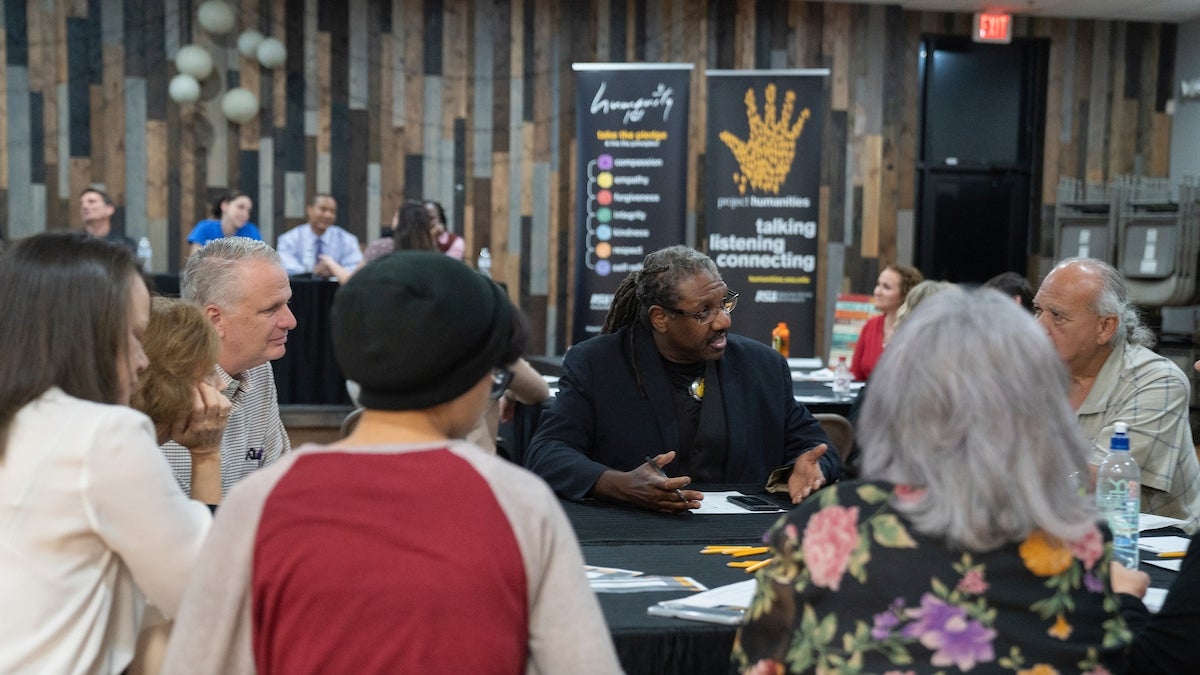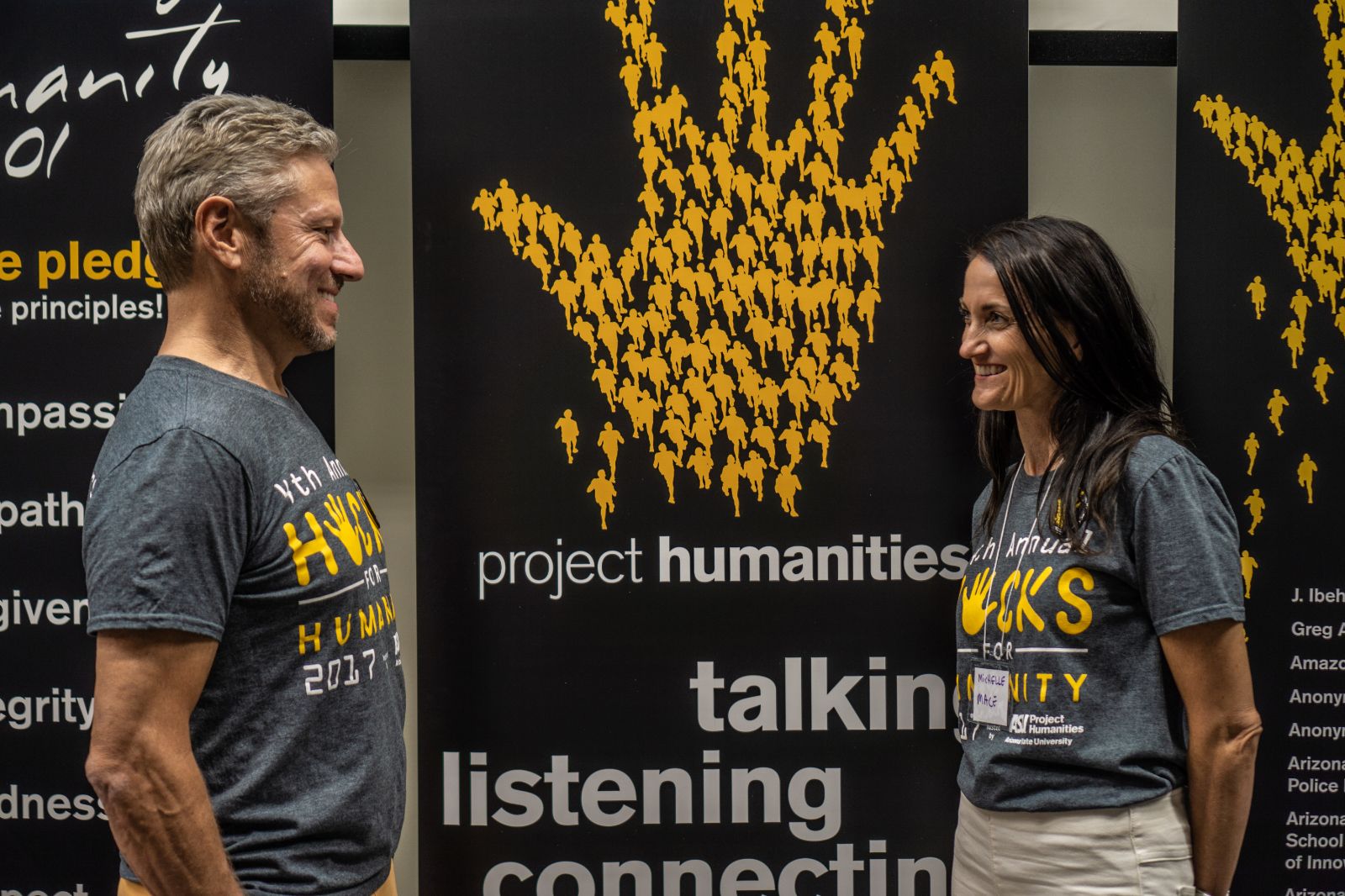Arizona State University’s Project Humanities has developed a reputation for its provocative and engaging programming. This year is no exception.
In the past eight years, Project Humanities has tackled a wide variety of hard-hitting issues. Past topics have included romance and autism; death and dying; rape culture; menstrual equity; environmental justice and sustainability; suicide prevention; drag kings and queens; arranged marriages in India; beauty queens; body positivity; toxic masculinity; identity and intersectionality; and homelessness.
Thanks to a generous gift by Valley business leaders Michelle Mace and Jim Tuton and their Come Rain or Shine Foundation who believe in and participate in Project Humanities’ mission, this fall’s lineup will see a big emphasis on "conscious parenting."
“Our Project Humanities team is always looking for ways to facilitate critical conversations that strive to make us better thinkers, better citizens and better humans,” said Neal A. Lester, the founding director of Project Humanities and an ASU Foundation Professor of English. “That our programming appeals to diverse individuals and groups across and beyond Arizona speaks to our solid track record of having our finger on the pulse of what matters to people every day. This fall continues our commitment to challenging ourselves and our supporters as individuals and communities to be better and to do better.”
The multiple award-winning initiative brings together individuals and communities across Arizona to instill knowledge in and demonstrate the vitality of humanities study and research and humanist thought and engagement. Project Humanities facilitates conversations across diverse communities to build understanding through talking, listening and connecting.
The 2019 fall lineup will examine religious and theological stereotypes, parenting after a child’s suicide, food and identity, the ethics of sex work and how to be an effective ally.
Parenting — broadly conceived and multidirectional — will take top billing this year, with programming beginning this fall and into the spring semester. According to Lester, “Parenting is not relegated to biology or legality. Plus, parents are also parented even as some parents parent. With ASU researchers and community members coming together for these conversations, the expectation is that attendees will see effective parenting as directly connected with our individual and shared humanity.”
And that’s why the Come Rain or Shine FoundationThe name Come Rain or Shine was chosen by Mace and Tuton based on their belief in the importance of unconditional forever love. gifted $25,000 to Project Humanities — the largest single donation in its eight-year history — to host four parenting programs this semester.
“We have all experienced life from at least one side of the parenting relationship — we were all kids once,” Mace said. "As adults, we can proceed unconsciously to be busy with life, often hurting others obliviously due to our own unmet needs from the past. I believe that parenting is where all of our behavior started — the good and the bad. I want to see a better society and be an agent for social change through raising awareness for conscious parenting."
Mace added that "conscious parenting" is about being a better human, which sometimes involves re-parenting ourselves and then our children.
"The decisions we regret most in life are the ones made out of reaction versus with reflection," Mace said. "In order to live more peacefully with the past, we can know better by learning the Humanity 101 principles, inspire people to improve their own lives and their relationships with their children."
Project Humanities will host these events and activities at different community venues around the Valley, bringing together students, staff, faculty, alumni, emeriti and members of the public to engage critically with Project Humanities’ Humanity 101 core principles: compassion, empathy, forgiveness, integrity, kindness, respect and self-reflection.
Valley business leaders Jim Tuton and Michelle Mace at Hacks for Humanity 2018, a 36-hour entrepreneurial marathon hosted annually by ASU's Project Humanities. This year Tuton and Mace have gifted the award-winning initiative to host four programs on parenting. Photo courtesy of Warren Chu
All events are free and open to the public.
Humanity 101 on the Homefront: ‘Conscious Parenting’ and Social Change
6 p.m., Aug. 27. Westside Multi-Generational Center, 715 W. Fifth St., Tempe
This community conversation critically engages a parenting philosophy that prescribes tools such and mindfulness and self-care rather than power and control.
Humanity 101 on the Homefront: Parenting Across Cultures
Noon, Sept. 4. ASU West campus, 4701 W. Thunderbird Ave., La Sala Ballroom A, Phoenix
This discussion explores how “culture” determines more than just the ethics and values adults pass on to their children. Culture also shapes how adults educate, nurture and discipline children.
Dispelling the Myths: Heretics, Pagans, Atheists and Polytheists
6 p.m., Sept. 18. Humanist Society of Greater Phoenix, 627 W. Rio Salado Parkway, Mesa
Atheists, pagans and polytheists face a slew of stereotypes and discrimination for their beliefs. This program is an opportunity to dispel common myths about these worldviews while highlighting their humanistic beliefs.
Humanity 101 on the Homefront: Parenting and Suicide
6 p.m., Sept. 24. ASU Preparatory Academy, Phoenix Elementary School Auditorium, 735 E. Fillmore St., Phoenix
Many consider suicide a silent epidemic in the United States. This program explores methods to prevent suicide, promote suicide literacy, and navigate grief in the aftermath of suicide — all through the lens of parenting.
Vital Voices: Food, Identity, and Politics
6 p.m. Oct. 3. Sema Foundation, 325 N. Austin Drive, Chandler
Food is not only a staple of life, but a staple of one’s own identity. It can also highlight social disparities. Attendees are asked to bring a favorite dish, passage, song, photograph, story, performance, poem or artifact that embodies a personal or communal relationship with food to this community discussion.
Ethics and Intersectionality of the Sex Trade
6 p.m. Oct. 28. UMOM New Day Centers, 3333 E. Van Buren St., Phoenix
Sex trafficking is a form of enslavement that involves force, coercion or deceit. Sex work — such as escort services, pornography and webcam modeling — entails voluntary engagement in sex services. This discussion parses out these complexities by local experts, professionals and activists.
Evolving Allyship Workshop
6 p.m. Nov. 6. City Square Church, 701 S. First St., Phoenix
In an era when so many opt to combat injustices through safety pins and hashtags, what constitutes an authentic, substantive allyship? Is simply being a “good person” enough? This interactive workshop offers strategies for allies to combat such issues.
Humanity 101 on the Homefront: Talking to Children about the Bad, the Ugly and the Inevitable
6 p.m. Nov. 7. ASU Polytechnic Campus, 7001 E. Williams Field Road, Cooley Ballroom, Mesa
Understanding societal ills such as intersecting systems of oppression, illness, violence, war and death can be difficult for everyone. It becomes even more challenging when adults have to explain to children these common life occurrences. This community conversation explores strategies for these difficult conversations.
The First Rainbow Coalition
6 p.m. Nov. 21. Tempe History Museum, 809 E. Southern Ave., Tempe
This PBS Indy Lens Pop-Up event features a screening of Ray Santisteban’s documentary that charts the history and legacy of a groundbreaking multiethnic alliance of community groups that changed the face of 1960s Chicago politics. A facilitated discussion immediately follows the screening.
More information on Project Humanities’ 2019 fall events.
Top photo: Neal Lester, director of ASU's Project Humanities, speaks with attendees at a 2018 discussion called "The Bell that Tolls: A Conversation on Death and Dying." Photo by Marcus Chormicle/ASU Now
More Arts, humanities and education

‘It all started at ASU’: Football player, theater alum makes the big screen
For filmmaker Ben Fritz, everything is about connection, relationships and overcoming expectations. “It’s about seeing people beyond how they see themselves,” he said. “When you create a space…

Lost languages mean lost cultures
By Alyssa Arns and Kristen LaRue-SandlerWhat if your language disappeared?Over the span of human existence, civilizations have come and gone. For many, the absence of written records means we know…

ASU graduate education programs are again ranked among best
Arizona State University’s Mary Lou Fulton College for Teaching and Learning Innovation continues to be one of the best graduate colleges of education in the United States, according to the…



